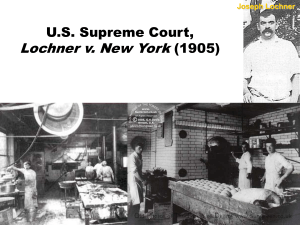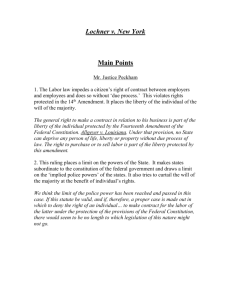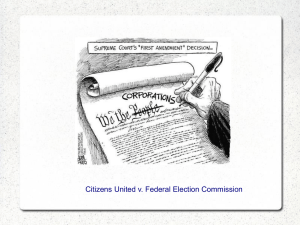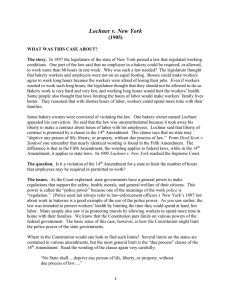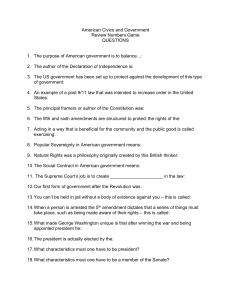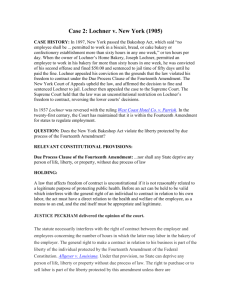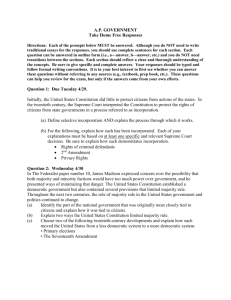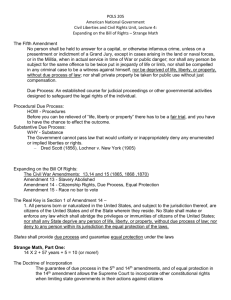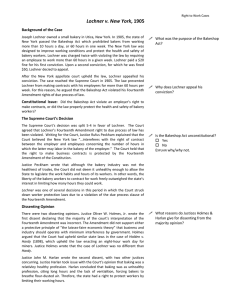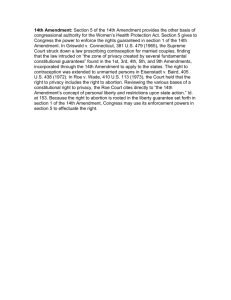1905 Lochner - OSPI Moodle Server
advertisement
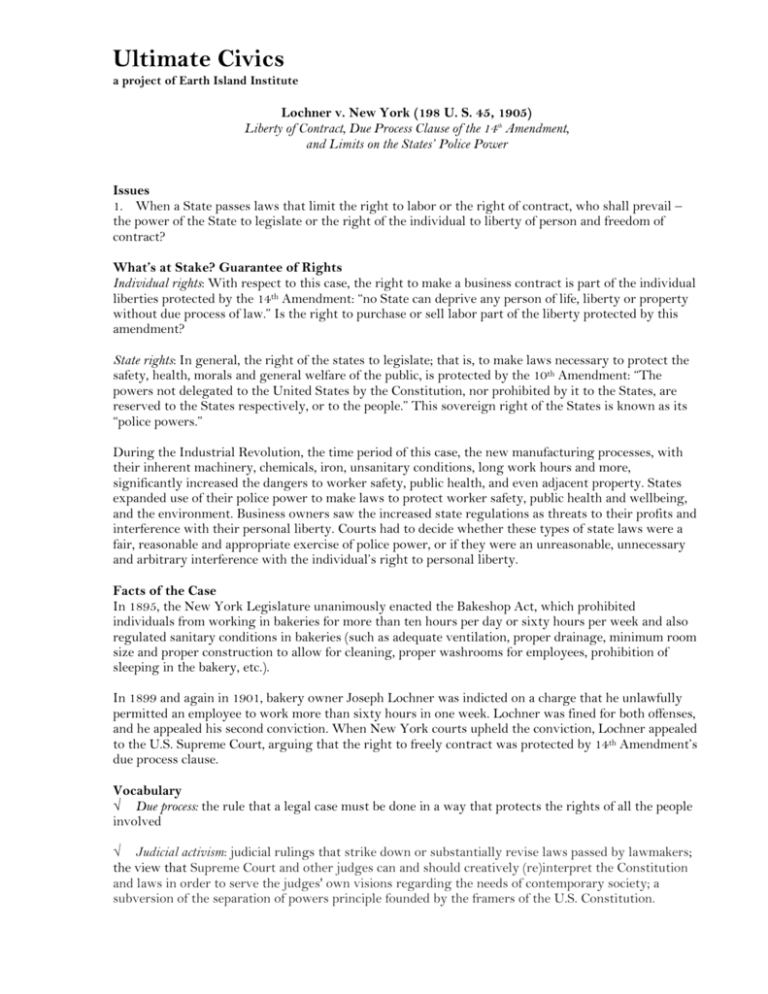
Ultimate Civics a project of Earth Island Institute Lochner v. New York (198 U. S. 45, 1905) Liberty of Contract, Due Process Clause of the 14th Amendment, and Limits on the States’ Police Power Issues 1. When a State passes laws that limit the right to labor or the right of contract, who shall prevail – the power of the State to legislate or the right of the individual to liberty of person and freedom of contract? What’s at Stake? Guarantee of Rights Individual rights: With respect to this case, the right to make a business contract is part of the individual liberties protected by the 14th Amendment: “no State can deprive any person of life, liberty or property without due process of law.” Is the right to purchase or sell labor part of the liberty protected by this amendment? State rights: In general, the right of the states to legislate; that is, to make laws necessary to protect the safety, health, morals and general welfare of the public, is protected by the 10th Amendment: “The powers not delegated to the United States by the Constitution, nor prohibited by it to the States, are reserved to the States respectively, or to the people.” This sovereign right of the States is known as its “police powers.” During the Industrial Revolution, the time period of this case, the new manufacturing processes, with their inherent machinery, chemicals, iron, unsanitary conditions, long work hours and more, significantly increased the dangers to worker safety, public health, and even adjacent property. States expanded use of their police power to make laws to protect worker safety, public health and wellbeing, and the environment. Business owners saw the increased state regulations as threats to their profits and interference with their personal liberty. Courts had to decide whether these types of state laws were a fair, reasonable and appropriate exercise of police power, or if they were an unreasonable, unnecessary and arbitrary interference with the individual’s right to personal liberty. Facts of the Case In 1895, the New York Legislature unanimously enacted the Bakeshop Act, which prohibited individuals from working in bakeries for more than ten hours per day or sixty hours per week and also regulated sanitary conditions in bakeries (such as adequate ventilation, proper drainage, minimum room size and proper construction to allow for cleaning, proper washrooms for employees, prohibition of sleeping in the bakery, etc.). In 1899 and again in 1901, bakery owner Joseph Lochner was indicted on a charge that he unlawfully permitted an employee to work more than sixty hours in one week. Lochner was fined for both offenses, and he appealed his second conviction. When New York courts upheld the conviction, Lochner appealed to the U.S. Supreme Court, arguing that the right to freely contract was protected by 14th Amendment’s due process clause. Vocabulary √ Due process: the rule that a legal case must be done in a way that protects the rights of all the people involved √ Judicial activism: judicial rulings that strike down or substantially revise laws passed by lawmakers; the view that Supreme Court and other judges can and should creatively (re)interpret the Constitution and laws in order to serve the judges' own visions regarding the needs of contemporary society; a subversion of the separation of powers principle founded by the framers of the U.S. Constitution. UltimateCivics.org 2 √ Laissez-faire economics: free market economics; the freedom of private business to organize and operate for profit in a competitive system without interference by government beyond regulation necessary to protect public interest and keep the national economy in balance √ Police power: the authority conferred upon the states by the 10th Amendment to the U.S. Constitution and which the states delegate to their political subdivisions to enact measures to preserve and protect the safety, health, welfare and morals of the community; the basic right of governments to make laws and regulations for the benefit of their communities in such areas as zoning, land use, fire and building codes, gambling, discrimination, parking, crime, licensing of professionals, liquor, motor vehicles, bicycles, nuisances, schooling and sanitation. √ Welfare: the health, wellbeing, happiness, security, protection, prosperity, success and fortunes of a person or group Arguments (excerpts from case brief and syllabus) Plaintiff: The New York law was a valid health measure addressing a legitimate state interest and enacted to protect the physical wellbeing of those who work in bakery and confectionery establishments. Also, restricting the hours of labor in the case of bakers was valid because “it tended to cleanliness on the part of the workers, as a man was more apt to be cleanly when not overworked, and, if cleanly, then his ‘output’ was also more likely to be so.” Defendant: The limitation of the hours of labor does not come within the police power on the grounds that bakers are not wards of the state – they can assert their own rights without interference from the State; that the interest of the public is not in the slightest degree affected by such an act; that clean and wholesome bread does not depend upon whether the baker works but ten hours per day or only sixty hours a week. However, other sections of the New York law may be wise and valid regulations, as they provide for the cleanliness and healthiness of the bakery’s workplace conditions. Decision The Supreme Court, by a vote of 5–4, held that the New York law restricting hours of employment in a bakery was invalid, because the regulation interfered with the right of contract between the employer and employee and did not constitute a legitimate exercise of the state’s police powers. The majority found that the limitation of hours of labor, under New York law, had no direct relation to the health of the employee (the baker) or public health as to justify the section of law as really a health law: “Statutes of [this]… nature, limiting the hours in which grown and intelligent men may labor to earn their living, are mere meddlesome interferences with the rights of the individual…” Lockner’s conviction was reversed. Dissent Justices Harlan, White, and Day: State police “power extends at least to the protection of the lives, the health, and the safety of the public against the injurious exercise by any citizen of his own rights… The liberty secured by the Constitution… to every person within its jurisdiction does not import an absolute right in each person to be, at all times and in all circumstances, wholly freed from restraint. There are manifold restraints to which every person is necessarily subject for the common good… “The responsibility therefore rests upon legislators, not upon the courts. No evils … could be more farreaching than those that might come to our system of government if the judiciary, abandoning the sphere assigned to it by the fundamental law, should enter the domain of legislation and… annul statutes [laws] that had received the sanction of the people's representatives… The public interests imperatively demand that legislative enactments should be recognized and enforced by the courts as embodying the will of the people unless they are…, beyond all question, in violation of the fundamental law of the Constitution.” UltimateCivics.org 3 Justice Holmes: Holmes accused the majority of judicial activism, pointedly claiming that the case was "decided upon an economic theory which a large part of the country does not entertain." He wrote: “But a constitution is not intended to embody a particular economic theory, whether of paternalism and the organic relation of the citizen to the State or of laissez faire [free market]. It is made for people of fundamentally differing views… I think that the word liberty in the 14th Amendment is perverted when it is held to prevent the natural outcome of a dominant opinion…” Consequences of the Case Lochner is one of the most controversial decisions in the Supreme Court's history. In what became known as the Lochner era from 1890 to 1937, the Supreme Court enshrined the liberty of contract. It used a broad interpretation of due process to protect economic rights in favor of laissez-faire (free market) economic policy. The court’s controversial decisions invalidated about 200 federal and state economic statutes, usually under the Due Process Clause of the 14th Amendment, statutes that sought to regulate working conditions during the Progressive Era and the Great Depression. During the quarter-century that followed Lochner, the Supreme Court also began to use the Due Process Clause of the 14th Amendment to protect personal (as opposed to purely property) rights, including freedom of speech and the right to send one's child to private school (which was the beginning of the line of cases that found a right to privacy in the Constitution). The Lochner era ended after President Roosevelt, fed up with the Supreme Court invalidating New Deal policies, threatened to "pack" the court with new appointees. The Supreme Court then began to take an expansive view of the government's power to regulate economic activities. Sources √ Definitions http://legal-dictionary.thefreedictionary.com/ http://www.merriam-webster.com http://www.thefreedictionary.com/ √ Cornell Legal Information Institute Syllabus, Opinion (Peckham), Dissent (Harlan), Dissent (Holmes) http://www.law.cornell.edu/supct/html/historics/USSC_CR_0198_0045_ZS.html √ http://en.wikipedia.org/wiki/Lochner_v._New_York √ Lochner era: http://www.law.cornell.edu/wex/lochner_era
